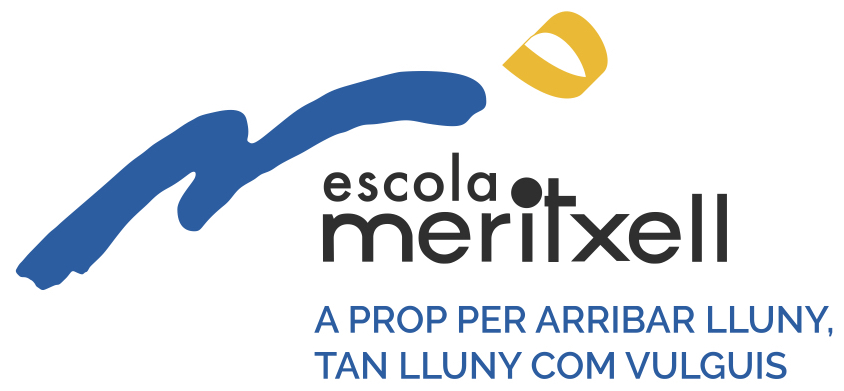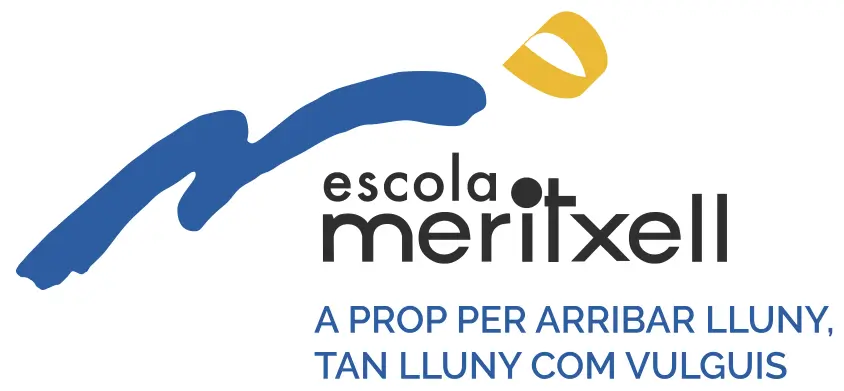Identity traits – Meritxell School

School’s definition
Meritxell School is a private organisation, located in the centre of the Maresme region, and rooted to the Catalan sociocultural reality. It is a mixed centre, of comprehensive education for life, socially open and democratic, secular, but respectful with our society values within the Christian culture.
The Meritxell Foundation is the school’s owner and holder. It is regulated by the Law of Foundations and its statutes. The Parents Association (AMIPA) is represented in the Foundation Board.
General educational objective
The main objective is the entire development of the student’s personality through a human comprehensive education and respecting the freedom and basic rights which are inherent to the human nature, according to the article 10, 1 and 2 of the Spanish Constitution. As well as the coexistence, intellectual and working habits, together with the ability of the ethic exercise of the profession.
Educational Model
The main objective is the complete student’s personality development through a comprehensive human education, the power of creativity, the freedom of speech, the good work and the cultural knowledge to serve the others. All this surrounded by a serious and hardworking atmosphere, in a balance between authority and freedom, and obedience and responsibility.
Methodological Line
Our education aim comprises a didactic methodology which considers:
- Learning models based on the acquisition of knowledge for the personal exploration, the usage and experimentation.
- An education based on the general abilities development, transversal habits and basic competences necessary for the complete civic integration.
- An education that considers, in a comprehensive way, the emotional, intellectual, physical and artistic development.
- A personalised education as an answer to the different processes of growing and maturing of each student.
- The encouragement of the student’s activity, individual and group work, with the intention of enhancing the autonomous learning.
- The specific incorporation of new information and communication technologies (TIC) to the teaching itineraries and the culture of the school functioning.
- The encouragement of a good climate for the comprehensive development of the students.
- The study of the education investigation and the analysis of possible applications to our reality.
- The development of new pedagogical experiences.
- The constant evaluation of the teaching practice, with the objective of changing or innovating positively to improve our quality of teaching and education.
Educational action
The Educational Action aims to the personality integration based on:
- The knowledge, acceptance and self-improvement.
- The development of the following skills: linguistics and literature, mathematics, arts and dynamic and body language.
- The physical and sports education as a centre for the basic integration between the intellectual, emotional and physical education.
- The autonomy in action, with independence, decision and critical ability, the freedom and responsibility in social life.
- A sensibility for the environment.
- The relationship with our culture and social environment, with the aim to transform society.
The working language
The Catalan language is used for school communication and for the first learning process. However, the Meritxell School also has the objective for the students to acquire a good command of the Catalan and Spanish languages.
Pluralism and democratic values
Departing from the reality of a plural society in the area of the political ideas, of the social tasks and the economic situations, we believe that the function of the school in this society is to orientate and to help pupils with the difficult learning process of mutual acceptance, tolerance, commitment and expression of their own ideas, without dogmatisms or arbitrary impositions.
Coeducation
In agreement with the principle of equality and no-discrimination that the educational activity imposes, the education that we offer to the pupils is identical and it is developed in a frame of coeducation.
Education for freedom
The education of free people constitutes one of the essential aims of our educational model. For this reason, the educational action seeks the pupil’s acquisition of a clear and authentic concept of freedom.
Education for justice and solidarity
Our teachers will act as free people and respectful with the freedom of others, and they will provide the students with partcipative strategies for the exercise of their responsibilities. The teachers will make sure all this is done within an atmosphere of dialogue which will favour the coexistence and the free expression without prejudices or mistrust.
Education for peace and coexistance
Justice is a requirement of the dignity and equality between men and women in a democratic advanced society.
The school promises to collaborate positively in the education for justice, provoking the critical reflection of the realities of injustice with the others, with generosity and spirit of service, from the contribution of the student’s own work.
Innovarion and communication opening
The school, besides fulfilling the education plans and the promotion in depth of the humanistic culture, proves to be opened to all the science and technological progresses.
About language learning, the european directives advice to learn the own language, the neighbouring country language and English, this one is for its character of real universal “lingua franca”, who awards an inestimable instrumental value as vehicle of communication in a global society.
And in our school, this means to set the objective of a good learning of the French language as well.
The european citizens
Europe’s construction demands the development of a new concept of citizenship among its inhabitants, which includes the awareness of shared values, which identify the Europeans from a social and cultural perspective, and the development of a new sense of multiple belonging.
The school bets on the education of the students according to the principles of this European dimension.
Intercultural education
The model of a future society will be plural from all points of view: cultural, ideological, ethnic … and will be characterized by a great mobility of its people.
The school will favour the students education to become citizens capable of coexisting with the difference, respectful with the diversity and with capacity of dialogue. The school will also boost the students’ acceptance of different points of view and the incorporation of those elements from other cultures that will enrich their own, a creative culture opened to innovations.
Institutional administration model
The school will promote a participative and democratic management through its representative organisms, real and effective in all its estates, and will favour the relationships with the institutions around it.
